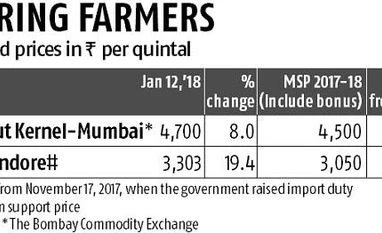Two major kharif season oilseeds have seen a sharp increase in their prices after the government in mid-November raised the import duty on edible oils, to protect farmers.
While soybean has become costlier by 19.4 per cent to Rs 3,303 a quintal, groundnut is up eight per cent since November when the government announced a duty hike, to trade currently at Rs 4,700 a qtl. Quoting at the time below the Minimum Support Price, both leading oilseeds of the kharif harvesting season have since jumped to trade above this benchmark (Rs 3,050 a qtl for soybean and Rs 4,500 a qtl for groundnut).
Prices of other oilseeds have also moved up, albeit less. The turnaround has cheered farmers and stockists alike. Oil mills have also started stocking before a further price spike. Both ways, farmers would benefit, presumably encouraging them to bring more area under oilseeds next season.
India's hike in import duty has led Malaysia to suspend export taxes on crude palm oil for three months effective January 8.
India's vegetable oil import fell 10 per cent in December from the same period last year. November's import saw a six per cent jump.
To check rising import of refined (RBD) palmolein, encourage the vegetable oil industry and maintain the duty difference between crude and refined palm oil at 15 per cent from the current 10 per cent, the import duty on the refined variety should be 45 per cent, from the present 40 per cent, says B V Mehta, executive director, Solvent Extractors Association. This will go a long way in improving capacity utilisation of the refining industry, he added.
Ajitesh Mullick, analyst with Religare Securities, believes the market undertone remains positive for soybean. "In the coming weeks, the pace of arrivals will be declining. Therefore, wholesalers will be showing interest in stocking from physical markets at every moderate price fall. Dry weather in Argentina will be another factor supporting the upward trend," he said.
To read the full story, Subscribe Now at just Rs 249 a month
Already a subscriber? Log in
Subscribe To BS Premium
₹249
Renews automatically
₹1699₹1999
Opt for auto renewal and save Rs. 300 Renews automatically
₹1999
What you get on BS Premium?
-
Unlock 30+ premium stories daily hand-picked by our editors, across devices on browser and app.
-
Pick your 5 favourite companies, get a daily email with all news updates on them.
Full access to our intuitive epaper - clip, save, share articles from any device; newspaper archives from 2006.
Preferential invites to Business Standard events.
Curated newsletters on markets, personal finance, policy & politics, start-ups, technology, and more.
Need More Information - write to us at assist@bsmail.in
)